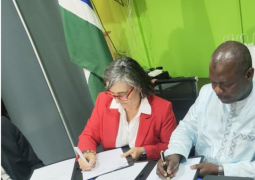
Addressing the NGO’s Forum on the sidelines of the 81st Ordinary Session of ACHPR as keynote speaker, Justice Minister Jallow said The Gambia, in line with its broader reform agenda to transition from dictatorship to democracy, has made significant legislative strides.
“For the first time, The Gambia has enacted the Prevention and Prohibition of Torture Act 2023, effectively domesticating the Torture Convention and criminalizing acts of torture,” he said.
“Over the past year, we have also passed the Anti-Corruption Act and the Victims Reparation Act. The government is actively working on establishing both an Anti-Corruption Commission and a Victims’ Commission to ensure these laws are effectively implemented.”
“I am pleased to inform you that The Gambia recently swore in its first-ever Access to Information Commission, marking the beginning of the enforcement of the Access to Information Act, which was enacted in 2021. This development is a significant step toward greater transparency and accountability.”
“Additionally, we enacted the Special Accountability Mechanism Act, a legislative framework guiding our Transitional Justice process, alongside the Act establishing the Office of the Special Prosecutor. These initiatives demonstrate our commitment to justice and accountability for past abuses.”
“Currently, the National Assembly is considering the revised Criminal Offences Bill and Criminal Procedure Bill. These are being comprehensively reviewed and updated for the first time since independence to align with contemporary realities and ensure a responsive criminal justice system.”
“Moreover, the National Security Bill is also before the National Assembly. Once enacted, it will significantly enhance and expedite the ongoing Security Sector Reforms, reinforcing national stability and security,” he revealed.
“These efforts collectively represent our unwavering dedication to building a just, transparent, and democratic society, where the rule of law and human rights are respected and upheld,” he observed, adding that human rights situation in Africa remains a complex and multifaceted issue.
“While there are positive developments in some areas, significant challenges persist.”
“Today, as we come together to address these pressing challenges, let us renew our commitment to building an Africa where every individual can enjoy their fundamental rights without fear. Only through collective action, solidarity, and sustained efforts can we hope to overcome these obstacles and pave the way for a more just, peaceful, and prosperous continent.”
“Despite some progress towards democracy, many African nations remain under authoritarian rule or quasi-democratic systems, leading to the repression of opposition parties and civil society. Arbitrary arrests, detention without trial, and political assassinations are not uncommon. Persecution on the grounds of race, religion, nationality, social group membership, or political opinion, along with civil wars, unconstitutional changes in government, external aggression, and natural disasters such as droughts, floods, and famines, contribute to widespread instability across the continent.”



